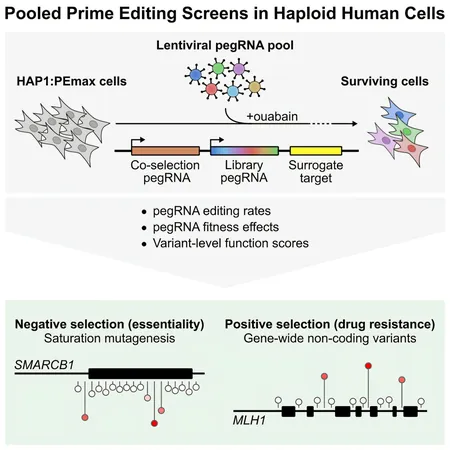
Revolutionary Pooled Prime Editing: Unlocking the Secrets of Genetic Variants to Reveal Disease Risks!
2025-03-24
Author: Yu
In a groundbreaking study conducted by researchers at the Francis Crick Institute, a novel genetic approach known as "pooled prime editing" has been successfully utilized to screen hundreds of genetic variants simultaneously. This game-changing technology holds the potential to significantly enhance our understanding of how different genetic variants influence the functionality of genes, especially in relation to diseases like cancer.
Genetic variations arise when alterations occur in DNA, leading to changes in the building blocks of our genetic makeup. While modern genetic sequencing techniques can identify these variations, many are often classified as "variants of unknown significance." This means that their impact on an individual's health, particularly concerning disease risk, remains ambiguous. The research highlights the critical need for methods that can elucidate these uncertainties, as understanding these variants could pave the way for more precise medical assessments and interventions.
Building upon their prior research utilizing saturation genome editing—a technique designed to map out all variants within a gene associated with cancer risk—the Crick team has expanded their toolkit with pooled prime editing, as detailed in a recent publication in *Cell Genomics*. First introduced in 2019, prime editing acts as a sophisticated "search-and-replace" mechanism that precisely alters targeted sections of the genome, thus offering a more refined method of genetic manipulation.
In their experiments, the researchers focused on two essential tumor suppressor genes, SMARCB1 and MLH1. Mutations in these genes are known to contribute to cancer development. By applying the prime editing platform, the team was able to identify specific mutations within the SMARCB1 gene that directly led to its functional loss and induced cell death.
Moreover, the MLH1 gene, associated with bowel cancer and which has over 2,000 recorded variants of unknown significance, was analyzed. Through this innovative screening, the researchers cataloged more than 700 variants and uncovered loss-of-function mutations in both coding and non-coding regions of the gene—areas previously overlooked but crucial to understanding genetic risk factors for cancer.
The findings indicate that pooled prime editing could revolutionize genetic research by enabling the efficient screening of thousands of variants at once. This method could eventually transition from the research lab to clinical settings, enhancing diagnostic tools for physicians and genetic counselors.
Michael Herger, a postdoctoral fellow involved in the study, emphasized the importance of understanding rare genetic variants, asserting that their research provides an invaluable resource for healthcare professionals making disease risk assessments. Christina Kajba, another co-author, noted that the ability to determine how genetic alterations influence cellular functions is a fundamental question in biology. The ongoing work aims to refine the technique further to evaluate an even wider array of variants with maximum efficiency.
The senior author, Greg Findlay, highlighted that prime editing's precision, combined with the ability to analyze numerous variants simultaneously, represents an exciting frontier in genetic research. Importantly, the study's implications extend beyond coding regions—a mere 5% of the human genome—into non-coding areas that play essential roles in gene regulation.
In summary, the implementation of pooled prime editing promises to clarify the murky landscape of genetic variants of unknown significance, providing invaluable insights for countless individuals navigating their genetic risk factors. As research continues to advance, this technique could transform the future of personalized medicine, offering clearer pathways to understanding and potentially mitigating disease risks associated with genetic anomalies.
Stay tuned as this revolutionary approach could redefine how we view and treat genetic disorders in the near future!



 Brasil (PT)
Brasil (PT)
 Canada (EN)
Canada (EN)
 Chile (ES)
Chile (ES)
 Česko (CS)
Česko (CS)
 대한민국 (KO)
대한민국 (KO)
 España (ES)
España (ES)
 France (FR)
France (FR)
 Hong Kong (EN)
Hong Kong (EN)
 Italia (IT)
Italia (IT)
 日本 (JA)
日本 (JA)
 Magyarország (HU)
Magyarország (HU)
 Norge (NO)
Norge (NO)
 Polska (PL)
Polska (PL)
 Schweiz (DE)
Schweiz (DE)
 Singapore (EN)
Singapore (EN)
 Sverige (SV)
Sverige (SV)
 Suomi (FI)
Suomi (FI)
 Türkiye (TR)
Türkiye (TR)
 الإمارات العربية المتحدة (AR)
الإمارات العربية المتحدة (AR)